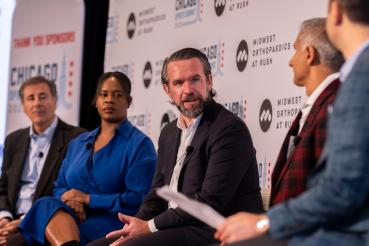An interdisciplinary team of faculty at Rush University is taking steps to strengthen planetary health education across Rush’s colleges with new funding from the Office of the President. Heide Cygan, DNP, RN; Andy Garman, PsyD; and Santosh Basapur, PhD have received the 2022 President’s Collaborative Research Award (PCRA) for their project looking at ways to empower health professionals, both at Rush and beyond, to think of themselves as leaders in planetary health, which is defined as balancing the needs of human civilization and the natural systems it needs to survive.
A 2015 Rockefeller Foundation - Lancet Commission report noted that health professionals are essential leaders in protecting planetary health. Cygan, Garman and Basapur say that this charge requires that health professionals acquire new skills not yet consistently included in their education at Rush. This, they say, leaves a gap between the needs of patients and the knowledge of those trusted to protect their health.
“In public health nursing, one of our guiding principles is that you cannot separate patients and communities from their environment,” Cygan says. “We see that clearly here in Chicago where the residents in the communities we serve on the West Side are experiencing more negative health outcomes than neighbors in different parts of the city.”
Cygan points out that students, as future leaders in patient care, need to comprehend their role in planetary health. “In order for our students to be change agents, it is essential that they understand how climate change impacts people and communities,” she says, “and how, as health professionals, they impact climate change.”
Each Rush college now takes its own approach to climate change education for its students. Cygan teaches the public health course for generalist entry master’s students in the College of Nursing. Her courses overlap with what Garman teaches in his health systems management and allied health classes in the College of Health Sciences, but their content differs to meet the educational needs of their respective students. In 2021, the College of Nursing joined the Nurses Climate Challenge as part of its larger commitment to practicing and educating in an environmentally friendly and sustainable way.
“Addressing climate change in health care education is critically important not only for the health of the planet but for the patients our students will one day treat,” says Christine Kennedy, PhD, RN, FAAN, dean of the College of Nursing. “The work Dr. Cygan and this team are doing is incredibly important and demonstrates the kind of leadership we need in health care.”
The project will begin by analyzing Rush University’s planetary health offerings and identifying gaps in awareness and education. “It’s our duty as educators to ensure that the next generation of health professionals have the skills they need to treat their patients and advocate on their behalf with planetary health as a framework,” Cygan says.
Later phases of the project will involve deploying a portfolio of educational resources, and then implementing a model that can sustain the initiative for students and faculty in the future.
“Funding from the PCRA will help us develop a plan that ensures all Rush students are prepared to lead the charge toward a healthier future,” Garman says. “By approaching this work collaboratively, we are role-modeling how our students will need to work toward this future.”
This project, which emphasizes interdisciplinary learning and solutions, is one of the first University-wide efforts to position planetary health education across the different health care disciplines. The team is taking this approach to further elevate health care professionals and Rush University as leaders in addressing human health threats.
“This is the time for innovation,” Basapur says. “We don’t have the luxury of time anymore as we move closer and closer to a climate crisis. Rush University is poised to make a meaningful, lasting impact on planetary health and this project gets us closer to actualizing that future.”
Join the inaugural planetary health symposium to hear more.



